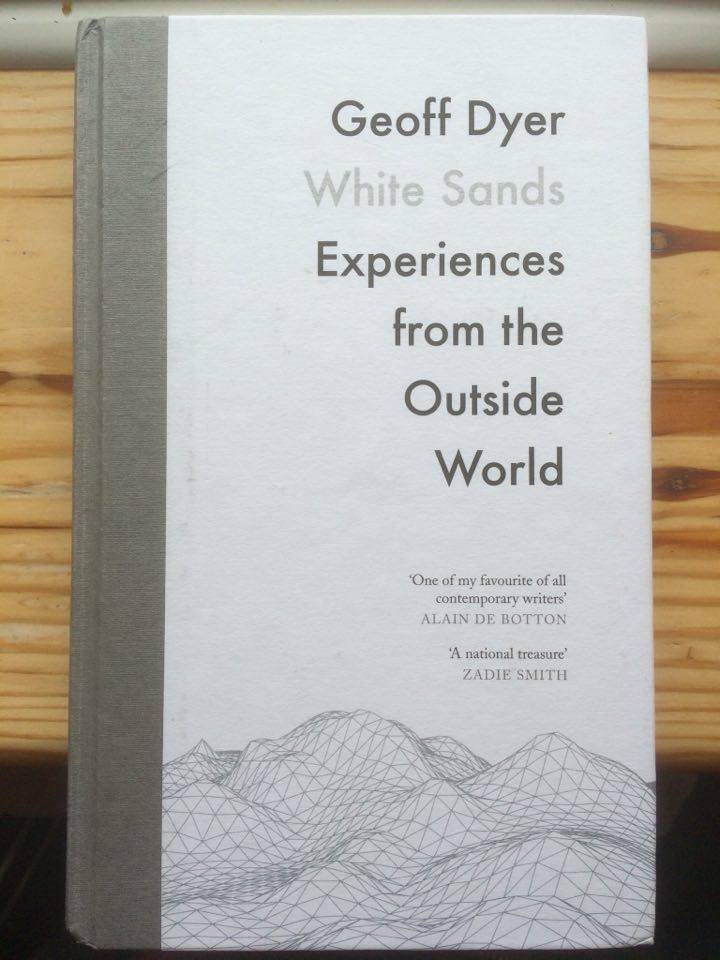Part of the experience of coming here is the attempt to understand and articulate one’s responses to the experience.
This introspective response to visiting new places is taken from a striking passage in Geoff Dyer’s latest collection of travel essays, White Sands: Experiences from the Outside World. Although the sentiment is expressed specifically after seeing The Lightning Field, a monumental piece of land art by Walter De Maria located in the New Mexico desert, the focus on the articulation of personal experience permeates Dyer’s work. The title is partly an allusion to D. H. Lawrence, who in his little-known essay titled ‘New Mexico’ described the sight of that state’s desert as ‘the greatest experience from the outdoor world.’ The reference is just one of a multitude of nods to canonical literary figures, and it reflects Dyer’s background as a novelist, critic, and essayist who, from time to time, branches out into travel writing; most notably with his 2009 work Jeff in Venice, Death in Varanasi. In his new foray into the latter genre, Dyer deconstructs what it means to be a traveller in the modern world, showcasing all the wit and precision of thought that made him a household name.
A note of caution at the outset: this book is not one for the reader of travel writing who seeks to gain extended insights into the places visited by Dyer. White Sands is about as far from a Lonely Planet guide as one could get, though it might share neighbouring space on bookshop shelves. The focus is not on the locations Dyer finds himself in, but rather on how he, as a traveller, responds to ever-shifting environments. We move through the world of this book with disorientating speed, from a pursuit of Gauguin in Tahiti, a tragically unrealised love affair in Beijing, encounters with land art in the American West, to a frustrated attempt to witness the Northern Lights in Svalbard, and, finally, to various perambulations around Dyer’s new-found homeland of urban California. The constant in this odyssey is Dyer himself, grappling with the desire to always be ‘somewhere else’. It is fortunate then that Dyer is a good travel companion: someone who sardonically observes the ever-changing landscape while fusing sparklingly philosophical musings with deadpan recounting of the banal.

In one memorable passage, for example, Dyer moves from an erudite discussion of the archaeologist Lewis Mumford’s observation that ‘It is only for their gods that men exert themselves so extravagantly’ to an amusingly straightforward description of his visit to The Lightning Field:
As it was, we ate cherry pie in the El Sarape café and took some pictures to prove we’d all been here together. There’s a dusty Ping-Pong table in the otherwise deserted Dia office. Ethan and I played a few games before we all headed out of town.
This mixing of the lofty with the mundane prevents this book from ever becoming overly pretentious. Dyer always takes care to remind the reader of the realities of travel – uncomfortable journeys, delayed flights, and lost belongings – while at the same time demonstrating the intellectual and emotional stimulation which travel can provide.
In an age when motorways and passenger airlines have dramatically reduced the time it takes to travel anywhere, bringing the world closer together and arguably normalising the exotic, you could be forgiven for thinking that the age of the great explorations has ended. Gone is the day, if ever it existed, when uncharted territory could be discovered and fame secured; geographically at least, we can no longer ‘go where no man has gone before’. In White Sands Dyer provides a stirring refutation of this pessimistic vision. As the book nears its end he describes an ancient statue of a Pharaoh and his queen which he encountered in Luxor. Though much of the queen’s form has eroded away over time, Dyer’s eyes trick him into seeing her hand on her husband’s shoulder. He writes,
The statue has been like this for thousands of years, but its delicacy is such that the fleetingness of the moment – a movement – has been preserved in stone. The ravages of time are caught – and reversed – in an instant. Time is alive, permanently.
In this final phrase Dyer reveals the philosophy behind his endless desire to be ‘somewhere else’. In a world constantly being altered by time, the traveller’s opportunities for new experiences are essentially infinite. As this changing world is more accessible than it has ever been before, one must seize the opportunity to strike out and capture as many of those fleeting experiences as possible, before time once more moulds reality into new forms. This is the optimistic and restless vision at the heart of Dyer’s work, a vision which impels the reader to head out and discover new experiences, just as the author’s prose entices them to keep turning the page
Ben Horton
‘White Sands’ is available to buy, RRP £16.99 (£13.59 from the publisher).
We are on Twitter @Oxford_Culture, and on Facebook